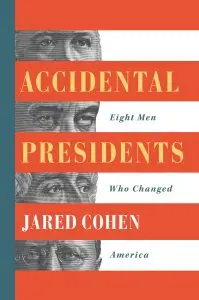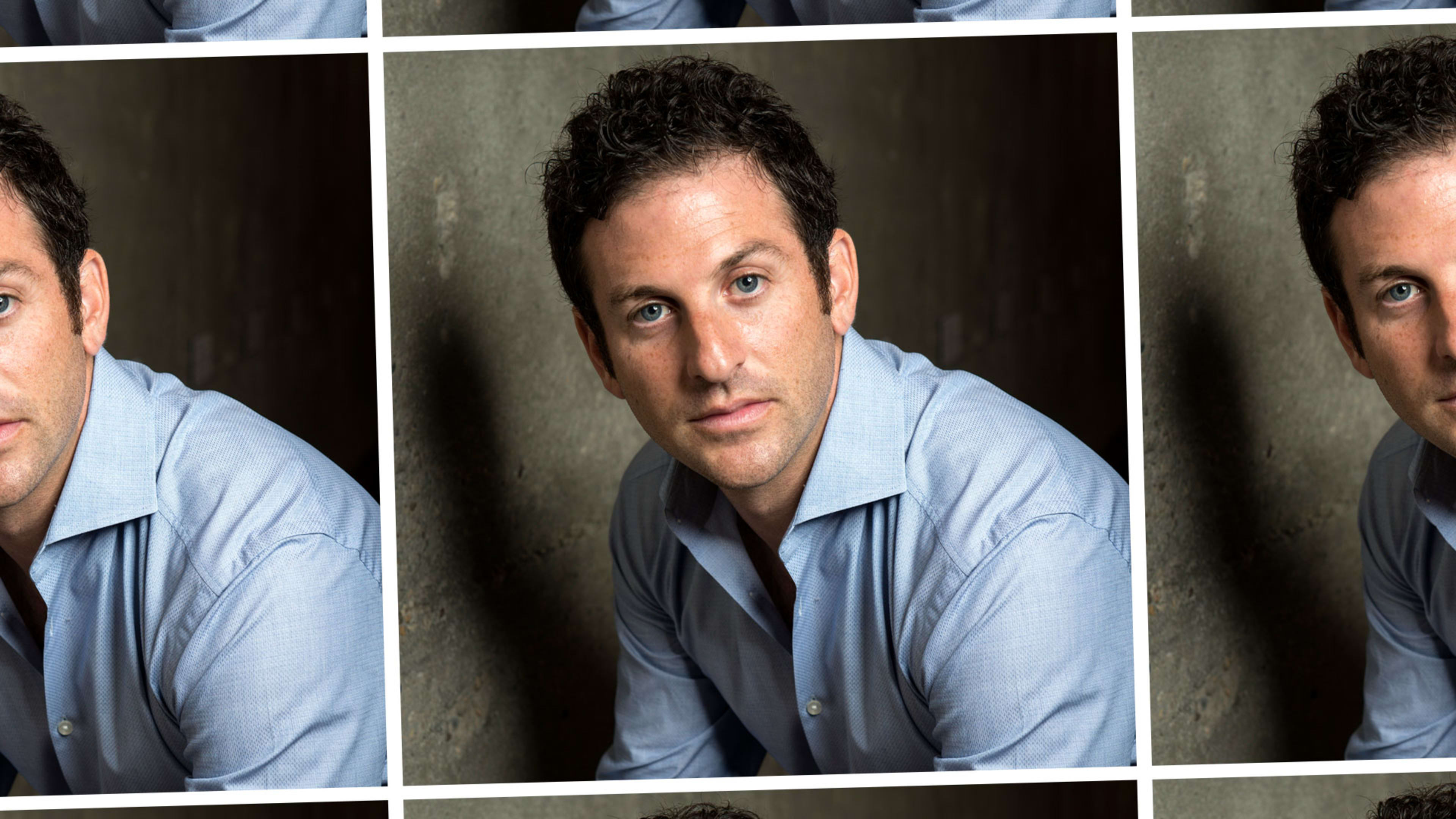By day, Jared Cohen uses technology to fight terrorism–he’s the CEO of Jigsaw, previously part of Google and now under Alphabet. Before that he served in the State Department and was a Rhodes Scholar at Oxford, where he earned his master’s in international relations. In his spare time, he’s a student of history and political science. His new book, Accidental Presidents: Eight Men Who Changed America, examines how unplanned presidential transitions have shaped America. Here, he talks with Wharton organizational psychologist Adam Grant about what he has learned about power and leadership succession from the men who ascended to the Oval Office without being elected.
Adam Grant: As the CEO of Jigsaw and a former State Department policy staffer, you’re an expert in cyber warfare and disinformation. What inspired you to write a book about the eight times in history a U.S. president died in office?
Jared Cohen: Since I was a very small kid, I’ve been obsessed with the presidents, and I’ve been particularly interested in these presidential transitions. My parents bought me a children’s book when I was 8 years old called The Buck Stops Here, which went up to Bush 41. They didn’t realize that, in buying me that book, they would have to have eight conversations about death, four of which were about assassination, with an 8-year-old. I stay out of the present with this book, but it’s interesting [to note] that we’re now in the longest period of time, in history, without a president dying in office.
AG: What did you learn about succession planning for the Oval Office?
JC: We still choose vice presidents based on a political moment during an election, not based on, “Is this somebody who you’d want in charge if the country was at war or in a major crisis?” And we don’t do anything to ensure that the vice president is properly prepared.
When Harry Truman was vice president, he wasn’t read into Yalta. He had no access to the Map Room, which is where the war was being planned. He had no idea what the country’s foreign policy was, what the military strategy was. He spent his first week as president just reading and getting briefed. You can blame FDR for this, and [Truman] does in his memoirs. But there’s also an element of responsibility that rests on the shoulders of the vice president, which is to self-teach and to prepare themselves, should the moment happen where the president’s heartbeat forces them to ascend to power.
I would also be in favor of Congress passing legislation requiring the administration to ensure the vice president is mandated by law to have a national security team, receive briefings on a regular basis. You could call it the preparedness law. It happens normatively, but there’s nothing to prevent the president from completely shutting his or her vice president out.
AG: You have these accidental presidents who were not picked by the people they had to lead. It’s similar to how people become business leaders: Employees don’t get to pick their CEOs.
JC: I think of a president winning an election and then serving as president as akin to a founder. They’re the ones who have the vision. They’re picking the people around them, shaping policy, exerting an inordinate amount of influence. In each of the instances I study in the book, the person who ascended to the presidency by accident was somebody who had been thrown on the ticket to win a state or a particular constituency.
Some went totally rogue and undid everything that the predecessor did. Some were compromisers: They had their own positions on things, but their presidency reflected a mixture of their predecessor and their own views. And then you had the ones who were resolute and had their own vision and almost had founder-like qualities themselves.
AG: What was the most important indicator of success in these kinds of accidental presidencies?
JC: The best leaders are the ones who can look at the group of advisors they inherit and be really thoughtful about that early decision of who to keep, who to cycle out, and how much institutional knowledge to bring along. The ones who are most successful find the right mix of new and old blood.
When Millard Fillmore ascended to the presidency [1850] he sacked Zachary Taylor’s entire cabinet, and ended up with no institutional knowledge. Harry Truman recognized that on foreign policy, the cabinet brought important institutional knowledge at a time when the country was at war. But he ended up playing musical chairs with his cabinet on the domestic front. LBJ held onto everybody. He should have cleaned out the foreign policy side, but he was afraid of the Kennedy intellectual elites who were advising him. Obviously, we paid a heavy price for it in Vietnam.
AG: How do you assert your own leadership when you’re taking over for the most powerful person on earth?
JC: These presidents had to strike a balance between being deferential to their predecessor’s vision and asserting themselves as a figure worthy of the presidency. Harry Truman was remarkable at not being seen as stepping on FDR’s vision and legacy but, at the same time, making it very clear that he was decisive. In the first four months of his presidency, he had to end the war in Japan, decide to drop the bomb, figure out what postwar order would look like, and figure out how to handle Stalin.
But you can’t charm someone into cooperation. LBJ was tireless [and unsuccessful] in his attempts to schmooze the Kennedy men into believing in him as his own figure. This is why [these accidental presidents] all became obsessed with winning the presidency in their own right.
AG: Is it important to be a good manager as well as an inspiring leader?
JC: They do have to manage people pushing their own competing agendas, trying to channel the predecessor. That’s a serious management task. But at the same time, they also really need to be leaders. Look at Teddy Roosevelt, who was probably one of the most productive presidents of all time. He ushered in a progressive era, in September of 1901, that never would have happened had he not ascended to the presidency upon the death of William McKinley. Roosevelt managed the implementation of an agenda–taking on the trusts–probably a decade or two before the country was ready for it. To do that, he also needed to demonstrate his own vision and leadership qualities, so that he would almost be seen as a founder in his own right. Because he understood how to be a leader and was pragmatic enough to understand that he needed to be a manager, he was able to keep a lot of McKinley’s men who really did not like him, who represented a totally different policy agenda, both domestically and internationally.
AG: There’s a classic study of leadership across industries showing that you can predict people’s leadership trajectories by looking at the characteristics of the jobs that they’ve had moving up the ranks. People who end up with unusually either fast or strong development trajectories historically have had unusual opportunities to take on unfamiliar responsibilities. Did you see something similar in how past experiences prepared these accidental presidents for leadership?
JC: What I find interesting is that the accidental presidents who were least prepared, they end up actually having, I don’t want to say successful presidencies, but they’re not disastrous. Take Chester Arthur. He was the embodiment of a machine politician. He spent most of his time as vice president undermining President Garfield. So much so, that when Garfield is shot in July of 1881, Arthur basically has to go into quasi-hiding because people think he’s responsible for the assassination. So he is not at all prepared to be president. He barely works, he spends all of his time as president hosting dinner parties and undertaking the largest renovations in the history of the White House and sleeping and going for walks and partying. But he ends up getting the 1881 equivalent of trolled by a mentally ill woman who lived on the Upper East Side in New York, who tells him he’s better than this. She writes 30-plus letters. It literally transforms him and he ends up blowing up the spoils system that he once embodied and passing the Pendleton Act, which created the modern-day civil service.

And then you look at Andrew Johnson and LBJ who, on paper, were qualified to be president, in terms of their past experience. Both had pretty disastrous presidencies. When Andrew Johnson took over for Abraham Lincoln, you go from The Great Emancipator to the last president to own slaves. Johnson was born a racist, died a racist, and ended up resurrecting huge elements of the Confederacy. LBJ’s record was mixed because he was exceptional on civil rights, but terrible on Vietnam.
AG: What was your biggest takeaway from working on this book?
JC: Even with eight presidents dying in office, one resigning in office, and 19 close calls, we’re still choosing running mates who are obviously ill-equipped to become president. The fact that John McCain chose Sarah Palin as his running mate is illustrative of this. With the election of 2020 on the horizon, I have zero confidence that the number-one consideration for a running mate is whether this is somebody we can imagine as president. I’m also struck that, despite all of this, we still don’t seem to be institutionalizing preparedness as part of how we see the role of the vice president. In businesses, we see founders making many of these same mistakes.
AG: You obviously put a lot of research into this project. As a tech CEO, what do you see as the value of reading history?
JC: I’m in an industry where people love talking about meditation and wellness and so forth. I don’t meditate and I don’t do the stereotypical wellness activities. I read history. Being in an industry that’s so defined by the science, I think doubling down on history and the humanities is one of the healthiest things for the soul.
Reading about history also forces you to think critically about these narratives and to form conclusions about other people’s experiences, what worked and what didn’t. If we don’t understand history, there’s no point in predicting the future, because we’re not drawing on where we came from. And we’re likely to make some of the errors all over again.
Recognize your brand’s excellence by applying to this year’s Brands That Matter Awards before the early-rate deadline, May 3.
